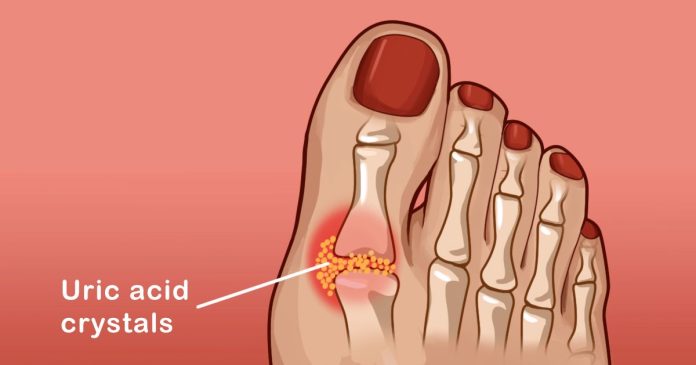According to WedMD, uric acid is produced by the body’s cells from natural breakdown and from the food we eat. Most uric acid is filtered by the kidneys and excreted from the body as urine. However, when the body produces too much uric acid, or when the kidneys are unable to remove it on their own, uric acid levels in the blood can become too high.
When uric acid levels are high, crystals form in the joints, leading to a common and painful condition called gout. High uric acid levels can also lead to kidney stones and kidney failure. There are several medications that can reduce the production of uric acid and effectively eliminate it from the urine, but fortunately, natural methods can also be used to excrete uric acid.
1) Limiting purine intake. According to the Arthritis Foundation, studies have shown that a diet high in purines increases uric acid levels and makes gout more likely to occur. Purines are chemicals found in foods that are converted into uric acid in the body. Red meat, oily fish and beer are very high in purines, and they should be limited for a healthy diet.
2) Avoid fructose; WebMD states that beverages containing fructose, such as fruit juices and sodas, are the culprits of excessive uric acid production. One study found that men who drank six or more servings of high fructose drinks per week had a higher incidence of gout.
3) Eat more dairy products Gout and You explains that dairy products such as milk, cheese and yogurt increase the excretion of uric acid in the body. In this case, choose low-fat dairy products.
4) Drink plenty of water. This helps the body stabilize uric acid at normal levels, diluting it and stimulating the kidneys to excrete it more efficiently.
5) Put on a glass of wine. According to the Arthritis Foundation, it’s long been known that beer increases the risk of gout, but wine is worse. One study showed that one or more glasses of beer or white wine in a 24-hour period increased the risk of a gout attack by 36 percent, and that risk increased with each subsequent glass. On the other hand, wine more than doubles the risk with just one or two glasses.
6) Deliciously reduce inflammation. The University of Maryland Medical Center recommends adding cherries, blueberries and strawberries to your diet; according to Livestrong, cherries and dark berries contain chemicals that help lower uric acid levels, while purple and blue berries contain anthocyanins, a substance that can help lower uric acid. flavonoids, which help lower uric acid levels and reduce inflammation and stiffness. Pineapple and celery also both have anti-inflammatory properties.
7) Cooking with olive oil According to the top 10 home remedies, most vegetable oils turn into acidic fats when heated or processed, and these fats destroy vitamin E in the body, which is essential for controlling uric acid levels. On the other hand, olive oil contains monounsaturated fatty acids, and these remain stable at high temperatures. Olive oil is high in vitamin E, which has antioxidant and anti-inflammatory properties.
8) According to News Medical, studies have shown that vitamin C increases the body’s ability to excrete uric acid. It can be taken as a supplement or added to the diet. Foods such as oranges, lemons, strawberries, tomatoes, bell peppers and broccoli are very high in vitamin C themselves.
9) Keep your weight down According to the Arthritis Foundation, obese people are inherently at risk for gout because they produce more uric acid and their kidneys don’t remove it as well. Studies show that obese people have about twice the risk of developing gout and develop it more quickly.
There are many causes of high uric acid levels, but simple diet and lifestyle changes can begin to lower them immediately. Gout is a painful disease and it is best to intervene naturally before it becomes so. If you already have pain or swelling in your joints (especially your big toe, ankle or knee), see your doctor. There is a simple test that can measure uric acid levels.










